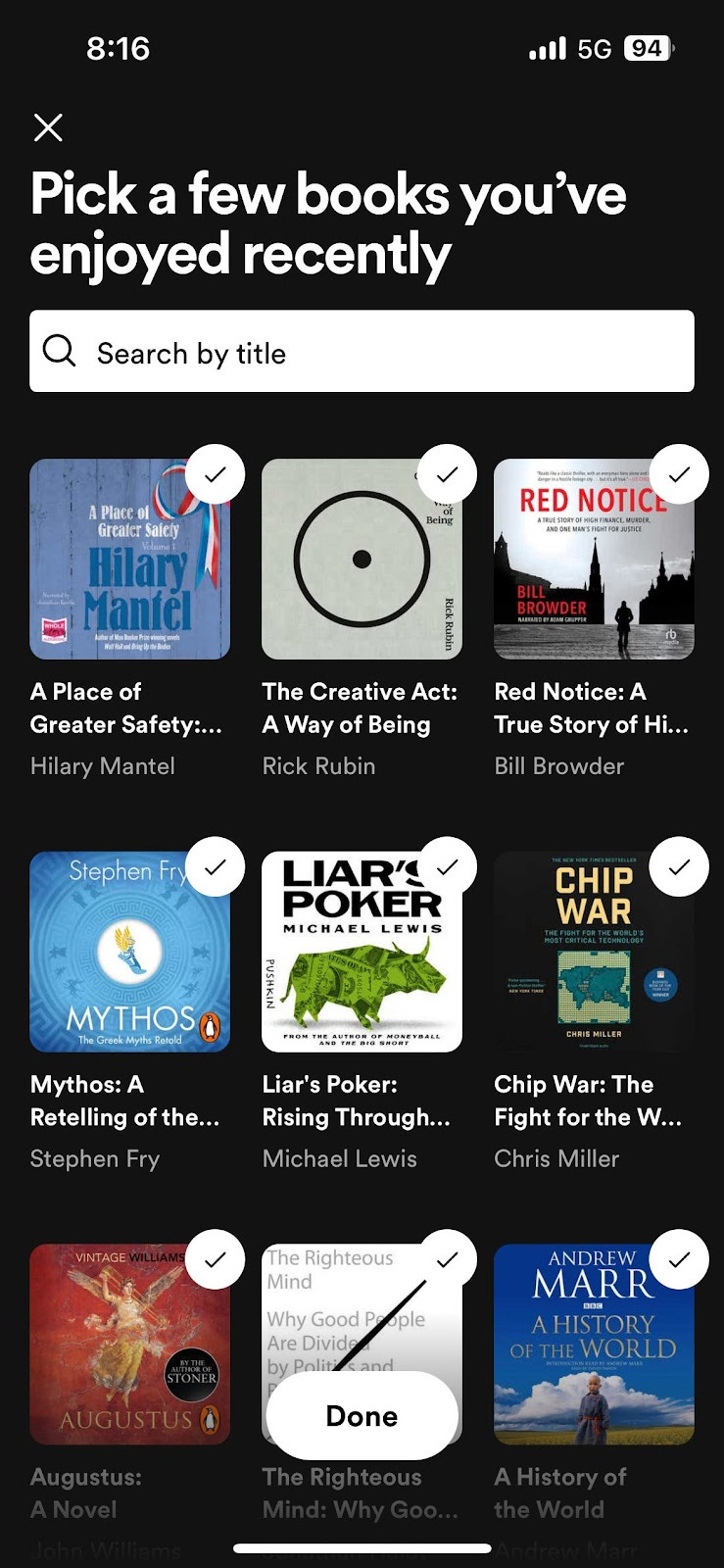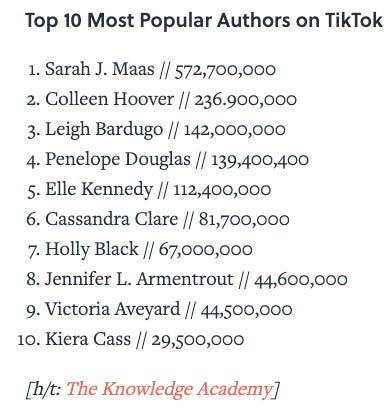Where could Spotify take Audiobooks?
Could we finally see a strong consumer tech product for book lovers?
No one has built a great tech product for book lovers. Goodreads and Audible could have been great, but their underinvestment in UX over the last decade means the apps continue to feel like a v1 from 2010. Emerging startups struggle to build scalable go-to-market strategies, and they often can’t get consumers to pay quickly enough to build a sustainable business model.
Long-time readers will know I’m a huge fan of Spotify. I first wrote about the opportunity in podcasting in 2020 and then revisited the company again in 2022 to explore the ways Spotify could improve its unit economics — including through an expansion into audiobooks with the Findaway acquisition.
When they finally released Audiobooks to users in the UK and Australia this month — including 15 hours of free listening for Premium users — it didn’t disappoint.
Spotify first bootstraps the recommendation engine by asking you to select some books you’ve enjoyed recently…
Then it quickly uses the podcasts and audiobooks you like to recommend further books.
The podcast recommendations above show why Spotify has a unique opportunity to build a novel product offering in books; there’s a strong crossover between podcast and book listening preferences, allowing Spotify to deliver accurate book recommendations to subscribers.
Here are some initial ideas for what could become possible with Spotify Audiobooks:
Authors Reach a Wider Audience
When Spotify launched in music, it enabled musicians to reach an audience while bypassing the gatekeeping record labels that decided which artists deserved airplay. Artists like Chance the Rapper and Billie Eilish were able to build a fanbase on their own terms.
Though some authors self-publish, it’s hard to get distribution as an independent author. With Spotify’s audience of 226 million Premium subscribers, and its sophisticated marketing tools originally built to help the music industry, emerging authors should have an easier time finding niche audiences and building their careers.
Finding those niche audiences should be considerably easier as the long history of authors promoting their new books on podcasts provides training data to map authors, subjects, and podcast hosts, which will improve book recommendations to subscribers.
Tighter links between podcasts and books will improve the UX for listeners, who may discover a new author through an interview on a podcast, click on a pop-up or a link in the show notes, and start listening to that book immediately.
Audiences will become even larger as AI’s rapid improvements in language translation allow authors to write in one language but access listeners all over the world by taking a speaker’s voice and replicating it across many different languages, opening up access to foreign language podcasts and books.
Book Clubs
I have spent many hours in the past imagining what Goodreads could have been.
Spotify could recreate the literary social network through the creative use of playlists as bookshelves. For instance:
Celebrities can create playlists with the books they love - imagine Oprah Winfrey and Bill Gates releasing their book club lists on Spotify rather than their websites.
Shared playlists with friends for your book club with all the books you’re going to listen to.
Unique “Want to Read”, “Currently Reading”, and “Read” playlists for every subscriber.
Emerging Narrative Formats
Until now, we’ve had the short-form podcast and the long-form book. Journalists have experimented with the podcast format to tell longer-form stories through series like Serial, but could you now see the emergence of a similar series format for fiction?
In many ways, it would echo how authors published in the nineteenth century — Charles Dickens published Oliver Twist and Leo Tolstoy published War and Peace serially in newspapers.
Once emerging authors recognise the ability to get paid for their work through advertising revenue (rather than book sales) and reach a targeted niche audience through Spotify, there could be much more experimentation with narrative formats, similar to the emergence of the high-production-value TV series with the growth of Netflix.
Merch & Events
As the music industry transitioned from album sales to streaming royalties, concerts and merch sales emerged as a material revenue driver for artists. And the same thing could happen for authors.
The rise of #booktok, where some authors have hundreds of millions of views, shows that fandom is still possible in the world of literature:
I love the idea of thousands of fans wearing their favourite authors’ t-shirts and selling out venues for events.
Grazing
Everyone tells you to give up a book if you’re not enjoying it, but the sunk cost of having bought the book often causes many to soldier on. The same behaviours applied in audiobooks until now.
By allowing 15 hours of listening, rather than a certain number of books, Spotify enables users to try a book, see if they like it, and then move on if they don’t. The number of books you can sample expands enormously in that context, and Spotify recently shared that users have listened to 28% of the catalogue in the first 2 weeks since launch.
If you know anyone working at Spotify, forward them the email. I would love to hear their thoughts on how the product roadmap will evolve to reimagine the literary experience for audio in the 21st century.
Links I loved
Claudia Goldin recently won the Nobel Prize in Economics. I challenge you to listen to this and not want to have dinner with her and ask her 1000 questions:
For that narrow subset of people who enjoy both classical and electronic music:
Another excellent Essential Mix from Barry Can’t Swim:





